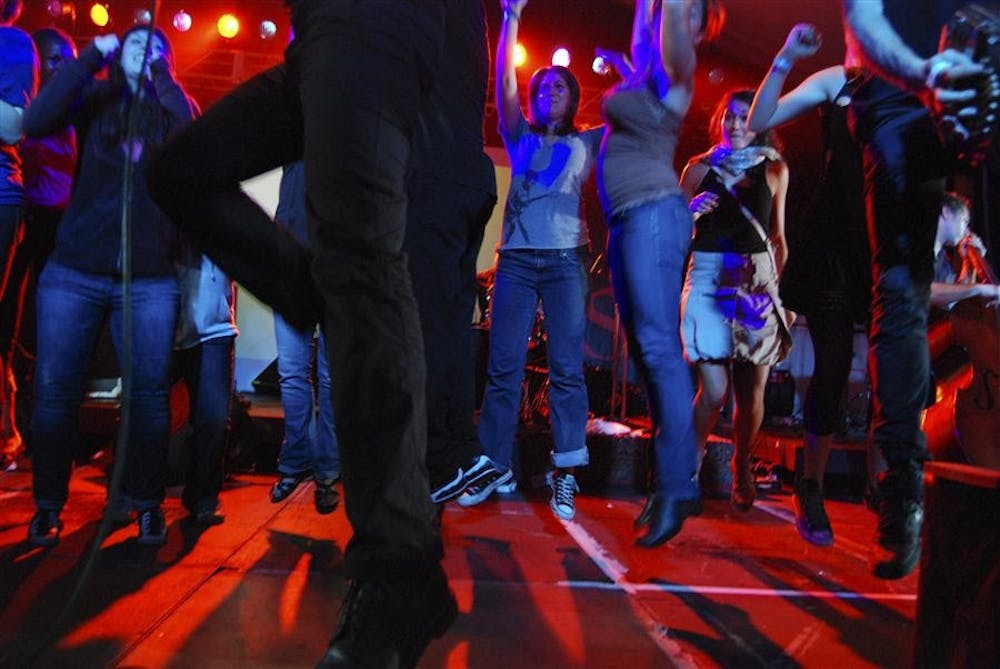This weekend, Ghanaian musician Bernard Woma will be doing what he said is expected of him: sharing the gift God gave him.
From Sept. 16 to 19, artists from across the globe will be performing at Bloomington’s 17th annual Lotus World Music and Arts Festival.
With more than 20 performances happening each night at various venues across town, this year’s festival is another opportunity to learn and experience cultures from around the world — all in a Midwest college town.
The festival, which started in 1995 as a one-night event with three small venues, now spans four days and attracts people from all around the world. LuAnne Holladay, assistant director of the Lotus Education and Arts Foundation, said 10,000 visitors are expected to attend this year’s festival, which has a mix of free and ticketed events.
The inspiration for the festival’s name comes from Lotus Dickey, a folk singer, songwriter and musician from Orange County, Ind. who passed away in 1989.
Remembered for his love of connecting and honoring his community through folk music, Dickey had a passion and appreciation for musical traditions around the world.
“He loved all kinds of different music,” Holladay said. “He was a very open person and curious — a real part of the world even though he was from just down the road.”
Starting off the festival will be the Women of Lotus concert at 7 p.m. Thursday at the Buskirk-Chumley Theater.
Friday through Sunday the streets of downtown Bloomington will be the stage for a multitude of musical performances and the Arts Village.
“You’ll have the most fun if you don’t have solid plans on who you want to see,” Holladay said. “If you don’t open yourself up to all of these unexpected things you weren’t planning to see, you close yourself off.”
The Lotus Education and Arts Foundation, a nonprofit organization, was created in 1994 to instill the importance of exploring the world’s diversity through artistic expression.
“The educational outreach program reaches 10,000 students,” Holladay said. “Art is part of being a creative person. You’re not as complete a person if you don’t have access to those things.”
Holladay is particularly excited for the performances by Saakumu Dance Troupe, led by graduate student Bernard Woma, who is currently pursuing his masters degree in African Studies.
“He is one of the best in the world on the instrument that he plays,” Holladay said.
Born in a village in Northwest Ghana, Woma said he cannot recall his first memory of music.
“That’s like asking someone what is their first memory of speaking,” Woma laughed.
What Woma does remember is he was destined to be a musician from the day he was born.
During his first moments on earth, Woma’s father noticed his newborn was clinching his fists as if he were holding xylophone mallets. This was a sign Woma was meant to become a xylophone player, according to traditional beliefs.
“My father was told to get me the instrument so I could play so that I could have my talent with me,” Woma said.
As he learned to walk around the age of 2, Woma said he simultaneously learned to play the xylophone, which in Ghana is called a gyil.
Bernard practiced his musical talents day and night. While his musical abilities gained him recognition throughout Ghana, Woma continued his craft while working on farms and eventually going to school.
Woma said in most African communities, music is not made to be packaged for economic gain. It is a creative extension of the community, and the musician must view their profession as an honor.
“As a musician in a community, you have to have it in the back of your mind that you are holding the history of your people — the repository of your culture,” he said.
In 1982, Woma moved to Accra, Ghana’s capital, in order to earn money working 20-hour days for a wealthy Ghanaian family.
Despite the overwhelming work schedule, Sunday evenings remained a special time: playing the gyil for traditional Dagara dancing. Through these performances he drew praise for his talent and went on to receive numerous honors and the chance to play his music all around the world.
While traveling the globe, Woma said he appreciates sharing his culture through music and is also grateful for the chance to be immersed in a diverse world
of traditions.
“Music does connect with community because music is part of the rational therapy with people’s minds,” Woma said. “It can bring joy, peace and love and a recognition of the community to the outside world.”
With a desire to share his love and connection to music, Woma opened the Dagara Music and Arts Center in a suburb of Accra in 1999. Students reside and work at the center as they study Ghanaian art, dance, drumming and xylophone music.
“There is value in appreciating each others diversity,” Woma said.
Of the values and tenants that Woma sees in society, he said that music and dance are some of the primary ways to share your culture.
“Music is beautiful, dance is inviting,” he said. “It’s not a secret to be kept from
the audience.”
During their performances at this year’s festival, Woma said audience members can expect for his dance troupe to ask them to show their appreciation by dancing along with them.
Woma and the Saakumu Dance Troupe will perform Friday and Saturday. A complete schedule of performances can be found online at lotusfest.org
Aside from the chance to see other musicians display their talents and traditions, Woma said what he’s most looking forward to this weekend will be “knocking people’s socks off.”
Lotus Fest: World music and arts brings community together annually

Get stories like this in your inbox
Subscribe





